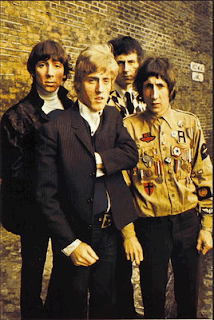Power pop is a genre of popular music that emerged at the junction of pop and rock styles in the late 1960s and combined melodiousness, vocal harmony and riff song structure in which instrumental soloing is minimized. Power pop songs are usually compressed and controlled by the powerful work of the rhythm section.
Some of the compositions of The Everly Brothers (“I'll See Your Light”, “It Only Costs A Dime”), The Kinks (“You Really Got Me”) and The Beatles (“Paperback Writer” , "Day Tripper"). Many consider the early Beatles hits (“From Me to You”, “She Loves You”, “I Want to Hold Your Hand”, “Can’t Buy Me Love”) to be the source from which power pop originates. The Byrds, The Beach Boys, The Beau Brummels, The Hollies, The Zombies, The Small Faces played an important role in the development of the style.
In 1970-1971, a new leader of power pop appeared: the British band Badfinger (hits “No Matter What”, “Baby Blue”, “Day After Day”, “Come and Get It”). In the United States, The Raspberries assumed the same role two or three years later. Big Star's first album is also considered important for the development of
the genre, along with Blue Ash, The Flamin Groovies, Artful Dodger.
Meanwhile, in Britain, musical development took a different path: talented groups that could become power-pop stars were at the head of the glam-rock movement. Close to The Bay City Rollers, the power pop, were representatives of bubblegirl pop. In the late 1970s, with the advent of the new wave, power-pop got a second wind: the groups Cheap Trick, The Knack, Boomtown Rats, The Jam, Blondie, The Cars, Buzzcocks, XTC were very successful. In the following years, Elvis Costello also had a special influence on power pop.
History
The term Power pop was first introduced by Pete Townsend, The Who guitarist: this is how he defined his band’s style in 1967. Things like “I Can't Explain”, “The Kids Are Alright”, “Substitute”, “I'm a Boy”, “Happy Jack”, “So Sad About Us”, “Pictures of Lily” are considered early classic power pop.Some of the compositions of The Everly Brothers (“I'll See Your Light”, “It Only Costs A Dime”), The Kinks (“You Really Got Me”) and The Beatles (“Paperback Writer” , "Day Tripper"). Many consider the early Beatles hits (“From Me to You”, “She Loves You”, “I Want to Hold Your Hand”, “Can’t Buy Me Love”) to be the source from which power pop originates. The Byrds, The Beach Boys, The Beau Brummels, The Hollies, The Zombies, The Small Faces played an important role in the development of the style.
In 1970-1971, a new leader of power pop appeared: the British band Badfinger (hits “No Matter What”, “Baby Blue”, “Day After Day”, “Come and Get It”). In the United States, The Raspberries assumed the same role two or three years later. Big Star's first album is also considered important for the development of
the genre, along with Blue Ash, The Flamin Groovies, Artful Dodger.
Meanwhile, in Britain, musical development took a different path: talented groups that could become power-pop stars were at the head of the glam-rock movement. Close to The Bay City Rollers, the power pop, were representatives of bubblegirl pop. In the late 1970s, with the advent of the new wave, power-pop got a second wind: the groups Cheap Trick, The Knack, Boomtown Rats, The Jam, Blondie, The Cars, Buzzcocks, XTC were very successful. In the following years, Elvis Costello also had a special influence on power pop.
In addition to them, the new generation of power-pop groups included The Kids, Shoes, The Records, The Motels, Bliff Bang Pow, etc. , and on the formation of the style of Britpop, in particular, such groups as Blur, Oasis, Pulp. In the 2000s, alternative rock groups focused on power pop (The New Pornographers, Super Furry Animals, etc.) also emerged.


No comments:
Post a Comment